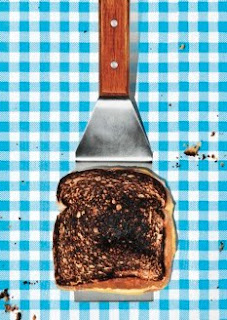>
Although the ending of this story fell flat for me, the rest of it was terrific. The unnamed first person narrator is an underachiever who, at the age of 25, has convinced himself that steadily working his way up the hourly wage scale at a restaurant is a kind of success, and maybe the only kind open to him. He’s battling his manager though, and his apparent inability to make a grilled cheese sandwich. He is burdened by the expectations of his family and also the neat category into which he fell after high school: one “entering directly into the workforce.” Those words spoken by the cocky valedictorian of his class during their graduation ceremony still resonates for him—and haunt him.
The story gets interesting when a new waitress begins work at the restaurant. She’s “pretty but had no breasts or ass,” and is anorexic. Even so, at least she’s college-bound, which is more than the narrator can say. She calls him “funny boy.” And then “boy.” And then he thinks he hears her call him “pretty boy.” And it is apparently the first nice thing he’s ever heard about himself. “Really?” he asks.
There’s more going on here that I haven’t quite nailed down. What’s with the “Emerging International City?” for example. And what’s the joke about the plane crash got to do with anything?
The story requires more thought, but on first reading it’s most enjoyable.
March 1, 2010: “Appetite” by Said Sayrafiezadeh


>To me, it screams "novel excerpt" which is why I thought there wasn't really an ending.
I enjoyed it too for the same reasons as Cliff. However, I found it overwritten in places, where the reader is intrusively told too much about how to imagine the characters. Here is an example — Actual text below:
“A grilled cheese sandwich was returned tonight,” my manager said. He stated it as if he were genuinely interested, philosophically speaking. “A grilled cheese sandwich and a plate of pasta. Why were they returned?”
Here is my suggested improvement:
“A grilled cheese sandwich was returned tonight,” my manager said. “A grilled cheese sandwich and a plate of pasta. Why were they returned?”
In other words, a sentence is in my opinion completely unnecessary, and I think the editor should have cut it.
But I was only around average in my undergrad creative writing class — do the accomplished writers here agree with me?
Paul Epstein
>Of course I wondered about the "novel excerpt" possibility, but the magazine says the author has a memoir coming out and says nothing of a novel.
As for your suggested edit, I disagree. The line "He stated it as if he were genuinely interested, philosophically speaking" is the narrator/protagonist's interpretation of what the manager said. The narrator is unreliable, particularly when it comes to his manager. So it reveals the character of the narrator and isn't really about how the manager said what he said.
>I thought this was an excellent story. I've read it only once and so let me go off my memory. The interior monologue, with its frequent recollections, is simple and fluid. It keeps you going, it steadily reveals more and more about the narrator. The end worked, I thought, although perhaps this is a story that reads best the first time around. Reminded me of Holden Caulfield, in a way.
>Honestly, I didn't like this story at all. I felt the language was stilted and the prose was stuffy. The "philosophically speaking" quote Paul brought up is an example, and there are dozens of others. I don't think they can be justified adequately by saying they are used to build an unreliable narrator; unreliability should've been created, in my opinion, without the clumsy descriptions (which also seemed definitely out of character to me).
Besides, the abrupt ending and the mostly uneventful narrative also give a strong sense of it being an excerpt (from a novel or a memoir).
I don't think much else can be made out of the scattered elements (such as the "Emerging International City" bit), which happened to be strewn together because of the crammed, freely associative style.
Having said that, there are undeniable indications of craft and of hard work on this piece. The way in which some elements (the valedictorian's speech, the hamster, etc.) are used in different parts of the story is an example. Another is the clever part about climbing up the wage ladder. However, these didn't manage to make the story interesting (at least not to this reader).
>This story is complicated as the themes, very American themes, are many and all revolve around the elements of an industrialized and detached society. The idea of people settling for "mediocrity" is crucial, as many people become so caught in their routine they helpless to change it; thus resulting in a depression that they are somewhat unconcious of. The narrator seems to absorb he has a problem, but is unable to define it. As a result, he simply continues as a hamster, as others who could impact his life, are birds, flying away to a better life.
>Interesting take, A. You have a point.
Still, I'd insist on the negative impression I have of the story. Notice, for instance, how many of these very important and very current themes are woven into Delillo's White Noise or Lorrie Moore's Birds of America stories (particularly in the first short story of the collection, with bird imagery and all), and yet there is very little to object to the language and to the narrative texture in Delillo or Moore. IMO, "Appetite" was a couple of drafts away from bringing those interesting themes to a powerfully-built story. But other people have liked it a lot, so maybe it's just me.